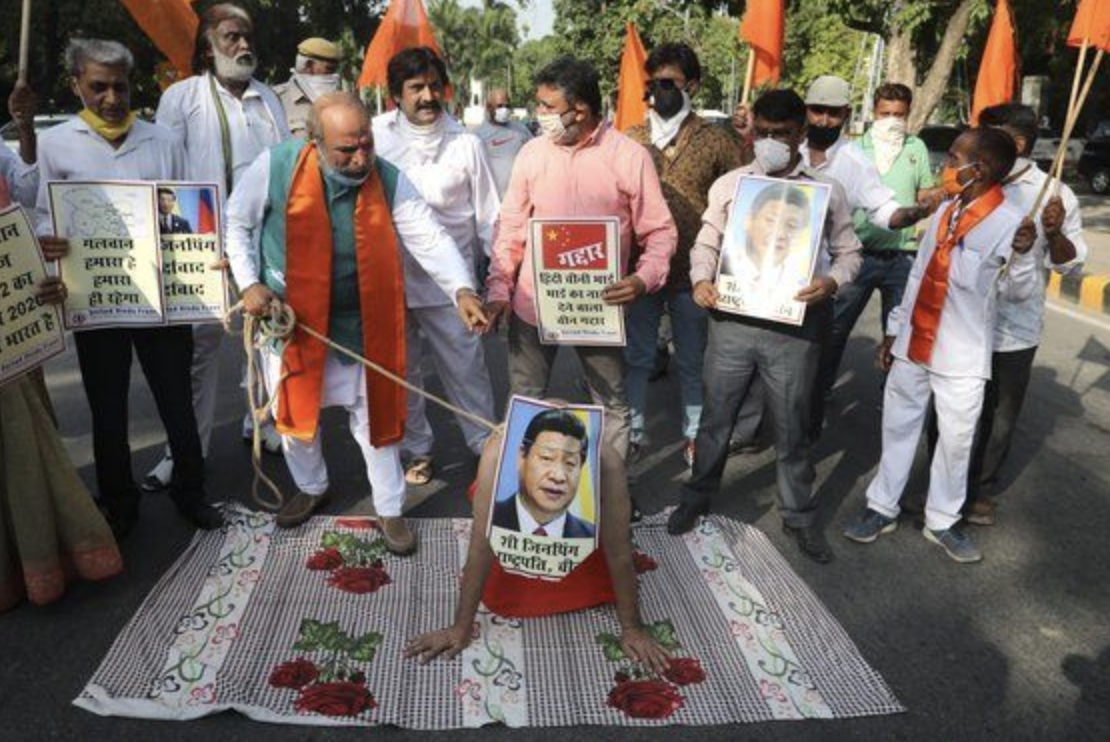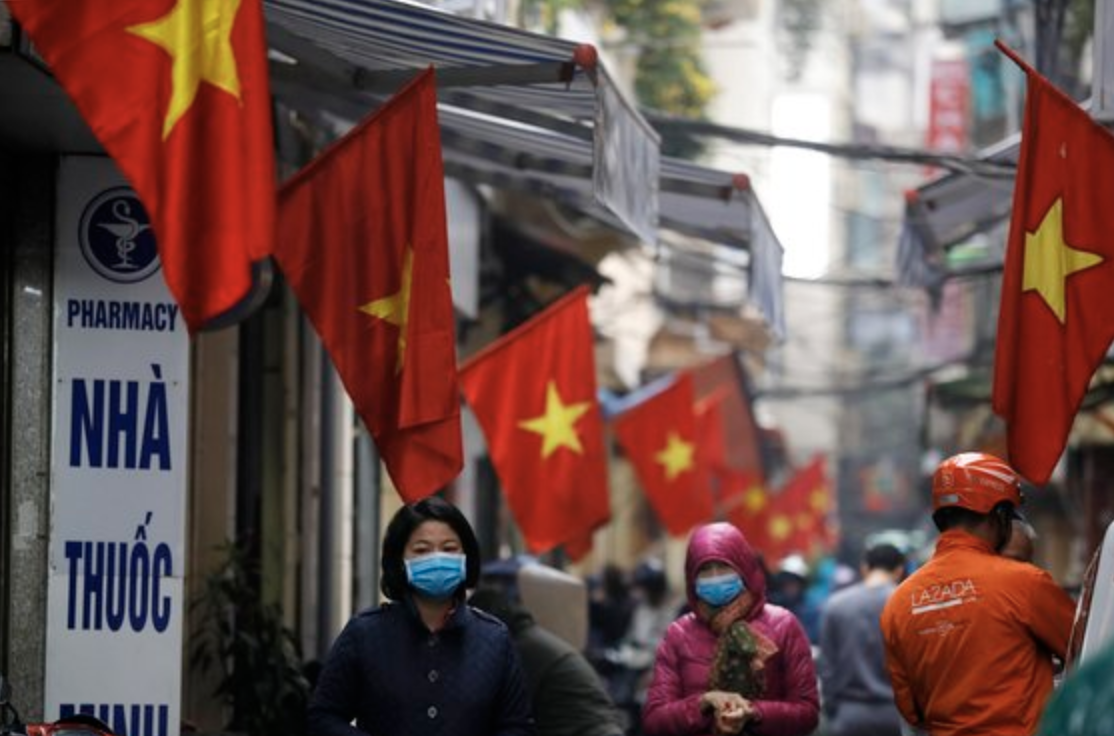미국하고 싸우는 데 집중해야 돼. 그런데 너희들...
몸집도 크고 힘도 세다. 순식간에 몸을 불렸지만, 오랫동안 랭킹 1위를 지켜온 적을 상대하는 일은 쉽지 않다. 집중해야 하는데, 그런데 ... 사방에서 아우성이다. 정신이 사납다. 미국과의 싸움에 온 힘을 기울여도 모자란데 이웃 국가들에게 온갖 항의를 받고 있는 요즘 중국의 상황이 꼭 이렇다.
China must focus in its fight with the U.S., but its neighboring countries stand in its way.
He is big and strong. And although he grew up quickly, it is not easy to face down an enemy who has been ranked No. 1 for such a long time. I need to focus, but...there is trouble from all sides. He must wake up.
China tries to gather its strength to fight with the U.S. but it is not enough. The situation in China is exactly like this these days, as China receives all kinds of protests from neighboring countries.
중국이 국경을 맞대고 있는 국가는 무려 14개국이다. 세계에서 가장 많다. 북쪽으론 몽골과 러시아, 동쪽으론 북한, 서쪽으로는 중앙아시아 국가인 카자흐스탄, 키리기스스탄 등과 맞닿아 있다. 남쪽으로는 인도와 네팔을 비롯해 동남아시아 국가들과 이웃하고 있다. 덩치는 크지만, 지정학적으로 결코 좋은 위치는 아니다.
There are as many as 14 countries bordering Communist China. It is the most in the world. China borders Mongolia and Russia in the north, North Korea in the east, and Kazakhstan and Kyrgyzstan in the west. To the south, it is adjacent to Southeast Asian countries, including India and Nepal. China is big in size, but not by any means a good place to be geopolitically.
미국과 비교해보면 더 선명해진다. 미국은 지정학적으로 '천운'을 타고난 곳이다. 위로는 캐나다, 아래로는 멕시코. 끝! 동쪽과 서쪽에는? 드넓은 대서양과 태평양이 펼쳐져 있다. 남쪽 해상에 쿠바가 있지만 국력으로 비교가 안 된다. 풍족함이 넘쳐흐르는 땅인데 적이 없는 형국이다. 한마디로 정리하면 이렇다. 적어도 국경 문제에서만큼은, 중국 정부가 골머리 싸맬 일이 미국보다 많다. 그것도 훨씬.
Compared to the U.S. it is clearer. The United States is a geopolitically innate ‘fortunate’ place: Canada to the north and Mexico to the south. That’s it! The end! What is to the east and west? The vast Atlantic and Pacific oceans. Cuba is on the southern coast, but it cannot considered a strong national power. The US is a land full of abundance and no enemy. In a word, this is how it is. At least on the border issue, the Chinese government has more to worry about than the United States and there is a lot more to it, too.
This is my land, and that's my land!
먼저 육지를 보자. 최근 중국과 가장 갈등이 격해진 곳은 인도다. 분쟁터는 히말라야. 불분명한 국경 때문에 수십 년간 갈등을 빚어온 '라다크 갈완 계곡'에서 지난 6월 유혈 충돌이 일어났다. 사상자가 발생해 감정은 격해졌고, 최신식 무기 구축 대결로까지 번지는 양상이다. 오지 중의 오지인 이 땅을 중국은 포기하기 싫다. 아니, 포기할 수 없다. 이 지역이 신장 위구르자치구와 티베트로 통하는 지정학적 요충지라서다. 위구르와 티베트는 독립을 꿈꾼다. 이들을 놓아줄 수 없는 중국은 탄압 정책을 펼치고 있는데, 이는 미국에 단단히 약점으로 잡혔다. 그러니 더더욱 놓칠 수가 없다.
Let's look at the land first. India is a place where conflicts with China have intensified recently: the battlefield is the Himalayas. A bloody clash broke out in June in the "Radak Galwan Valley," which has been disputed for decades because of an unclear border. Emotions have intensified due to casualties, and it is spreading to the latest weapons-building showdown. China does not want to give up this land, which is a remote region of the country. No, I can't give it up. This is because the area is a major geopolitical hub that leads to the Xinjiang Uygur Autonomous Region and Tibet. Uighur and Tibet dream of independence. China, which cannot let them go, is carrying out a vicious crackdown policy. The U.S. has grabbed a hold of this weakness.
그렇다고 인도가 만만하냐. 중국과 맞먹는 인구(약 13억 8000만 명)를 가진 인도, 땅도 넓고 경제 규모도 크다. 심지어 핵보유국(비공식)이다. 또 매년 중국에서 수백억 달러치 물건을 사들이는 주요 고객이다. 게다가 최근 중국 IT 기업들은 아시아, 그중에서도 인도를 주요 타깃으로 삼고 있다. 갈등이 커져서 좋을 게 없다. 얼마 전 인도 법원이 마윈 알리바바 전 회장을 부당해고 혐의로 소환한 일이 그 예다.
But India is not easy. India, which has a population equal to China (about 1.38 billion people), has a large land area and a large economy. It is even a nuclear power (unofficially). It is also a major customer who buys tens of billions of dollars worth of goods from China every year. In addition, Chinese IT companies have recently targeted Asia, especially India. There is nothing good about the growing conflict. For example, an Indian court recently summoned former Alibaba Chairman Ma Yun on charges of unfair dismissal.
작은 나라와도 크고 작은 갈등이 산재해 있다. 지난 6월, 중국군은 네팔의 작은 마을을 침입해 "여기는 티베트 영토이며, 티베트는 곧 중국 땅"이라고 선언한 후 점령해버렸다. 중국과 인도 사이에 끼어 전전긍긍하는 네팔이 이런 일을 당한 게 처음이 아니다. 중국은 지난해에도 티베트로 가는 길을 뚫는다며 네팔 땅을 자국에 편입해버렸다. 분노한 시민들이 시진핑 중국 국가주석 형상의 인형을 불태우며 격렬한 시위를 벌였을 정도다. 네팔 정부는 끙끙 앓고 있지만 차마 말을 못 꺼낸다. 중국의 경제적 지원을 받고 있어서다. 하지만 네팔에서 점점 거세지고 있는 반중 감정이 중국에 득 될 것도 없다. '일대일로'(해상과 육상 실크로드)는 시진핑이 애지중지하는 프로젝트인데, 네팔이 그 길목에 있기 때문이다. 이 밖에도 중국은 미얀마, 부탄 등과 영토 분쟁 중이다. 남쪽에서 땅을 접하고 있는 대부분 나라와 신경전을 벌이고 있다고 해도 과언이 아니다.
China has a lot of big and small conflicts even with small countries. Last June, Chinese troops invaded a small village in Nepal and occupied it after declaring "this is Tibetan territory, and Tibet is Chinese territory." It is not the first time that Nepal, which is in a state of war between China and India, has suffered such a thing. Last year, China also incorporated Nepal into its territory, saying it would pave the way to Tibet. Angry citizens even staged violent protests, burning dolls shaped like Chinese President Xi Jinping. The Nepalese government is struggling, but it cannot stand up to the Kingdom of China. It is because it is receiving economic support from China. However, the growing anti-China sentiment in Nepal is not good for China. "One Belt and One Road" (Sea and Land Silk Road) is a project that Xi Jinping cares about, and Nepal is on this road. In addition, China is engaged in territorial disputes with Myanmar and Bhutan. It is no exaggeration to say that the China is engaged in a war of nerves with most countries along its southern border.
강에선 물 틀어쥐고, 바다도 포기 못 해
I can't give up on the water and the sea
땅 위로 흐르는 강에 시선을 돌려보자. 동남아시아의 '젖줄'로 불리는 메콩강은 중국 고원지대에서 시작돼 미얀마, 태국, 라오스, 캄보디아, 베트남을 거쳐 바다로 흐르는 강이다. 그런데 몇 년 전부터 베트남 남부를 비롯한 동남아 곡창지대에 가뭄이 들기 시작했다. 땅이 쩍쩍 갈라지니 농사를 지을 수가 없다. 왜일까. 오직 지구온난화 때문일까? 중국이 메콩강 상류를 틀어쥔 탓이 크다. 중국 정부는 수자원을 최대한 활용하겠다는 목표하에 메콩강 상류 지역에 집중적으로 댐을 건설하고 있다. 같이 쓰는 물을 가둬두고 독차지하고 있으니 강 하류는 메마를 수밖에. 농민들의 고충은 이루 말할 수 없다. 메콩강 하류에 있는 베트남, 캄보디아는 열불이 나지만 항의가 먹히지 않는다.
Let's turn our eyes to the river that runs above the ground. The Mekong River, called the "wineline" of Southeast Asia. It is a river that begins in the highlands of China and flows through Myanmar, Thailand, Laos, Cambodia and Vietnam on its way to the sea. A few years ago, however, drought began in southern Vietnam and other Southeast Asian granaries.
The ground is so cracked that I can't farm.
Why? Is it only because of global warming? This is largely due to China's dominance over the upper reaches of the Mekong River. The Chinese government is intensively building dams in the upper reaches of the Mekong River with the aim of making the most of the water resource. They are keeping the water they use together and monopolizing it, drying up the river by the time it reaches everyone else. The plight of the peasants is beyond description. Vietnam and Cambodia in the lower reaches of the Mekong River are enraged, but protests don't work.
물을 쥔 자가 곧 권력, 중국이라서다.
강은 흘러 바다로 간다. 중국은 남중국해를 두고 대만, 베트남, 필리핀, 인도네시아 등과 분쟁 중이다. 국제사회는 중국의 남중국해 영유권이 없다고 판단했지만, 중국은 양보할 생각이 전혀 없다. 이 바다가 천연가스와 석유 매장 가능성이 높은 데다, 세계로 통하는 교역로이기 때문이다. 실효 지배를 위해 바다에 인공 섬을 만들 정도다. 가장 격렬히 항의하는 곳은 베트남이다. 길게 뻗은 베트남 땅 오른쪽이 바로 그 바다라서다. 베트남에선 종종 '남중국해 영해 침범'을 규탄하는 반중 시위가 격하게 벌어진다. 베트남 역시 중국과 경제적으로 점점 밀접해지고 있는데도 그렇다. 온 기운을 모아 랭킹 1위에 도전하고 싶은 중국. 그러나 이웃에선 반중 정서가 커져 간다. 몇 년 전만 해도 '중화민족 평화애호'를 외치며 "평화의 길을 걸어나가겠다"라고 다짐했던 시진핑 주석은 과연 평화롭게 꿈을 이룰 수 있을까. 아, 중국에 기쁜 소식이 하나 있긴 했다. 최근 로드리고 두테르테 필리핀 대통령이 "중국과의 전쟁을 감당할 수 없다"며 한발 물러선 것이다. "굴욕적"이란 비판에도, 경제 지원 등 다른 걸 얻어내는 게 낫겠다고 판단한 것으로 보인다. 중국이 으스댈 수는 있지만, 어찌 됐든 '공짜'는 아니란 얘기다.
It is because it is power, China, that holds water
The river flows into the sea. China is in disputes with Taiwan, Vietnam, the Philippines and Indonesia over the South China Sea. The international community has determined that China has no sovereignty over the South China Sea, but China has no intention of making concessions. This is because the sea is highly likely to contain natural gas and oil, and it is the trade route to the world. China even continues to create artificial islands in the sea for effective control. The most vehement protest is from Vietnam. This because the sea is on the right side of the long stretch of Vietnamese land. In Vietnam, anti-China protests often take place to denounce "infringement of territorial waters in the South China Sea." Vietnam is also becoming increasingly economically close to China. China wants to challenge for the top spot in the world with all its might.
However, anti-China sentiment is growing in along its bordering countries. Will President Xi Jinping, who only a few years ago vowed to "walk the path of peace," be able to achieve his dream peacefully? Oh, there was good news in China. Philippine President Rodrigo Duterte recently kowtowed to China, saying he could not got to war with China. Despite criticism of being "deplorable," he seems to have decided it would be better to get something in return, including economic aid. In other words, China may boast, but nothing is “free.”
Source: https://news.joins.com/article/23838940
[출처: 중앙일보] 미국 같은 '천운' 못 타고났다···사방에 적 깔린 중국 골머리






